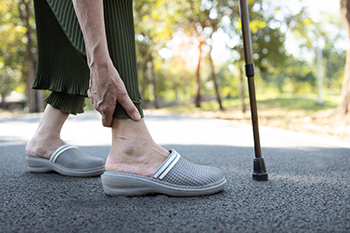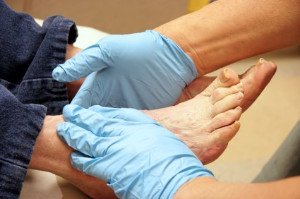Yakima
(509) 225-3668
Ellensburg
(509) 925-4633

Ankle pain in seniors can significantly affect mobility and quality of life. It often results from wear and tear on the ankle joint, leading to conditions such as osteoarthritis, where the cartilage cushioning the bones wears down. Another common cause is rheumatoid arthritis, an autoimmune condition that can cause joint pain and swelling. Ankle pain may also stem from past injuries, such as sprains or fractures that did not heal properly, or from changes in gait and balance as one ages. Poor circulation, gout, and nerve damage including peripheral neuropathy can contribute as well. It is important for seniors experiencing ankle pain to consult a podiatrist who can diagnose the cause accurately. Treatment may include medication for pain and inflammation, or wearing supportive braces or footwear. In some cases, if conservative treatments are not effective, surgical options may be considered. If you are a senior and experiencing ankle pain, it is suggested that you make an appointment with a podiatrist for an accurate diagnosis and treatment options.
Ankle pain can have many different causes and the pain may potentially be serious. If you have ankle pain, consult with one of our podiatrists from Cascade Foot & Ankle. Our doctors will assess your condition and provide you with quality foot and ankle treatment.
Ankle pain is any condition that causes pain in the ankle. Due to the fact that the ankle consists of tendons, muscles, bones, and ligaments, ankle pain can come from a number of different conditions.
Causes
The most common causes of ankle pain include:
Symptoms
Symptoms of ankle injury vary based upon the condition. Pain may include general pain and discomfort, swelling, aching, redness, bruising, burning or stabbing sensations, and/or loss of sensation.
Diagnosis
Due to the wide variety of potential causes of ankle pain, podiatrists will utilize a number of different methods to properly diagnose ankle pain. This can include asking for personal and family medical histories and of any recent injuries. Further diagnosis may include sensation tests, a physical examination, and potentially x-rays or other imaging tests.
Treatment
Just as the range of causes varies widely, so do treatments. Some more common treatments are rest, ice packs, keeping pressure off the foot, orthotics and braces, medication for inflammation and pain, and surgery.
If you have any questions, please feel free to contact our offices located in Yakima and Ellensburg, WA . We offer the newest diagnostic and treatment technologies for all your foot care needs.

Diabetes is a condition that affects multiple aspects of your health, including your feet. Individuals living with diabetes need to be vigilant about potential foot-related symptoms, as they are at higher risk of developing complications. One common symptom is peripheral neuropathy, which can manifest as tingling, burning, or numbness in the feet. This occurs when high blood sugar damages the nerves, impairing sensation. Reduced blood flow to the feet is another issue, leading to cold or discolored skin and slower wound healing. Diabetes can also cause changes in the foot's shape, such as Charcot foot, where the arch collapses. This may lead to deformities and instability. Additionally, diabetic individuals are more prone to foot ulcers and infections. It is important to pay close attention to these symptoms, as early detection and proper management are key to preventing severe complications. If you have diabetes, it is strongly suggested that you are under the care of a podiatrist who can help you to manage this condition.
Diabetic foot care is important in preventing foot ailments such as ulcers. If you are suffering from diabetes or have any other concerns about your feet, contact one of our podiatrists from Cascade Foot & Ankle. Our doctors can provide the care you need to keep you pain-free and on your feet.
Diabetic Foot Care
Diabetes affects millions of people every year. The condition can damage blood vessels in many parts of the body, especially the feet. Because of this, taking care of your feet is essential if you have diabetes, and having a podiatrist help monitor your foot health is highly recommended.
The Importance of Caring for Your Feet
Patients with diabetes should have their doctor monitor their blood levels, as blood sugar levels play such a huge role in diabetic care. Monitoring these levels on a regular basis is highly advised.
It is always best to inform your healthcare professional of any concerns you may have regarding your feet, especially for diabetic patients. Early treatment and routine foot examinations are keys to maintaining proper health, especially because severe complications can arise if proper treatment is not applied.
If you have any questions please feel free to contact our offices located in Yakima and Ellensburg, WA . We offer the newest diagnostic and treatment technologies for all your foot and ankle needs.

Swollen feet, a frequent and uncomfortable condition, can be triggered by a variety of factors. One of the most common causes is prolonged standing or sitting, which can cause fluid to accumulate in the lower extremities. Similarly, high salt intake can lead to water retention, resulting in swollen feet. Pregnancy is another well-known cause of foot swelling, due to increased blood volume and pressure on leg veins. Certain medications, like those for hypertension or hormone therapy, may contribute to edema. Injuries, such as sprained ankles or fractures, can also result in localized foot swelling. Additionally, underlying medical conditions like heart disease, kidney problems, or venous insufficiency can lead to edema in the feet. Lymphedema, a condition involving impaired lymphatic system function, is another possible cause. Recognizing the common causes of swollen feet is vital, as it can help you determine whether it is a benign issue or a sign of an underlying health problem. If you are concerned about persistent foot swelling, it is suggested that you consult a podiatrist for a proper diagnosis and guidance on managing the condition.
Swollen feet can be a sign of an underlying condition. If you have any concerns, contact one of our podiatrists of Cascade Foot & Ankle. Our doctors can provide the care you need to keep you pain-free and on your feet.
Swollen feet are a common ailment among pregnant women and people who stand or sit for extended periods. Aging may increase the possibility of swollen feet and patients who are obese often notice when their feet are swelling too. There may be medical reasons why swollen feet occur:
Swollen feet can also be caused by bone and tendon conditions, including fractures, arthritis, and tendinitis. Additionally, there may be skin and toenail conditions and an infection may cause the feet to swell. Patients who take medicine to treat high blood pressure may be prone to getting swollen feet.
Many patients elevate their feet to help relieve the swelling and this is generally a temporary remedy. When a podiatrist is consulted the reason behind the swelling can be uncovered and subsequently treated.
If you have any questions please feel free to contact our offices located in Yakima and Ellensburg, WA . We offer the newest diagnostic tools and technology to treat your foot and ankle needs.

Gout is a form of arthritis that can strike suddenly and inflict excruciating pain on its victims. Recognizing the symptoms is key to understanding and managing this condition effectively. The most distinctive sign of gout is the sudden onset of intense joint pain, often in the big toe. This pain can be so severe that even the lightest touch can be unbearable. In addition to pain, gout can cause swelling, redness, and warmth in the affected joint. Gout attacks are frequently accompanied by a feeling of tenderness, and the affected area can become so sensitive that even the weight of a bedsheet can cause discomfort. Gout sufferers may also experience limited joint mobility during an attack. Beyond physical symptoms, gout can lead to a diminished quality of life, making it vital to spot and address its signs promptly to minimize its impact on daily activities and overall well-being. If you have symptoms of gout, it is suggested that you consult a podiatrist who can properly diagnose and help you to manage this painful condition.
Gout is a painful condition that can be treated. If you are seeking treatment, contact one of our podiatrists from Cascade Foot & Ankle. Our doctors will treat your foot and ankle needs.
What Is Gout?
Gout is a form of arthritis that is characterized by sudden, severe attacks of pain, redness, and tenderness in the joints. The condition usually affects the joint at the base of the big toe. A gout attack can occur at any random time, such as the middle of the night while you are asleep.
Symptoms
Risk Factors
Prior to visiting your podiatrist to receive treatment for gout, there are a few things you should do beforehand. If you have gout you should write down your symptoms--including when they started and how often you experience them, important medical information you may have, and any questions you may have. Writing down these three things will help your podiatrist in assessing your specific situation so that he or she may provide the best route of treatment for you.
If you have any questions, please feel free to contact our offices located in Yakima and Ellensburg, WA . We offer the newest diagnostic and treatment technologies for all your foot care needs.